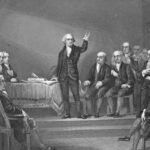During oral argument in the Trump immunity case, Justice Kavanaugh demonstrated a strong understanding of the “clear statement” rule. This rule suggests that statutes should not be applied to the President unless Congress clearly intended to subject the President to that constraint. Kavanaugh emphasized that there is always a “serious constitutional question whether a statute can be applied to the president’s official acts.” I discussed some of Kavanaugh’s insights in this post.
Professor Mike Ramsey noted that the clear statement rule, or the “presidential nonapplicability canon,” aligns with the major questions doctrine as a substantive canon. Both of these rules serve to prevent potential violations of the separation of powers. Justice Gorsuch has explained that the major question doctrine functions as an avoidance canon in service of the non-delegation doctrine. Similarly, the Presidential Avoidance Canon, as I described it during the Trump years, requires a clear statement from Congress to limit the President’s power in order to avoid potential constitutional conflicts.
The clear statement rule and the major question doctrine both operate as substantive separation of powers canons to prevent unconstitutional federal actions.
Justice Barrett has expressed reservations about the major question doctrine as a substantive canon, particularly in the student loan case. It remains unclear whether she would align with Justice Gorsuch’s dissent in Gundy regarding the non-delegation doctrine. However, the clear statement rule is particularly justified in the context of federal criminal rules because the notion of prosecuting a sitting President would have been unimaginable to the framers.
Justice Kavanaugh has critiqued Morrison v. Olson as a detrimental decision for the presidency and the country. The idea of subjecting a sitting President to criminal laws through independent or special counsels raises concerns about the separation of powers. While an OLC opinion may state that a sitting President cannot be indicted, questions remain about the broader implications of such actions.
Hypothetical scenarios about prosecuting former Presidents raise complex considerations about the statute of limitations and the potential for post-presidential prosecutions. The unique position of the President in relation to impeachment and criminal prosecution requires careful examination of these issues.
In the oral arguments of Trump v. Anderson, Justices Jackson and Gorsuch highlighted the importance of a clear statement regarding the applicability of constitutional provisions to the President. They emphasized the need for specific language when regulating the President’s actions. The Trump immunity case presents an opportunity to delve into the implications of these issues.





